Abstract
The ΔNp63 protein, a product of the TP63 gene that lacks the N-terminal domain, has a critical role in the maintenance of self renewal and progenitor capacity in several types of epithelial tissues. ΔNp63 is frequently overexpressed in squamous cell carcinoma (SCC) and in some other epithelial tumours. This overexpression may contribute to tumour progression through dominant-negative effects on the transcriptionally active (TA) isoforms of the p53 family (TAp63, TAp73 and p53), as well as through independent mechanisms. However, the molecular basis of ΔNp63 overexpression is not fully understood. Here, we show that the expression of ΔNp63 is regulated by the Wnt/β-catenin pathway in human hepatocellular carcinoma (HCC) and SCC cell lines. This regulation operates in particular through TCF/LEF sites present in the P2 promoter of TP63. In addition, we show that ΔNp63 and β-catenin are frequently coexpressed and accumulated in oesophageal SCC, but not in HCC. These results suggest that activation of the β-catenin pathway may contribute to overexpression of ΔNp63 during tumour progression, in a cell type-specific manner.
This is a preview of subscription content, access via your institution
Access options
Subscribe to this journal
Receive 50 print issues and online access
$259.00 per year
only $5.18 per issue
Buy this article
- Purchase on Springer Link
- Instant access to full article PDF
Prices may be subject to local taxes which are calculated during checkout







Similar content being viewed by others
Abbreviations
- CBF:
-
CAAT-binding factor
- HCC:
-
hepatocellular carcinoma
- PBS:
-
Pitx2-binding site
- RE:
-
responsive element
- SCC:
-
squamous cell carcinoma
- TA:
-
transcriptionally active
- TBE:
-
TCF/LEF-binding element; UTR, untranslated region
References
Adorno M, Cordenonsi M, Montagner M, Dupont S, Wong C, Hann B et al. (2009). A Mutant-p53/Smad complex opposes p63 to empower TGFbeta-induced metastasis. Cell 137: 87–98.
Ai D, Wang J, Amen M, Lu MF, Amendt BA, Martin JF . (2007). Nuclear factor 1 and T-cell factor/LEF recognition elements regulate Pitx2 transcription in pituitary development. Mol Cell Biol 27: 5765–5775.
Ambler CA, Maatta A . (2009). Epidermal stem cells: location, potential and contribution to cancer. J Pathol 217: 206–216.
Auriol E, Billard LM, Magdinier F, Dante R . (2005). Specific binding of the methyl binding domain protein 2 at the BRCA1-NBR2 locus. Nucleic Acids Res 33: 4243–4254.
Barbieri CE, Tang LJ, Brown KA, Pietenpol JA . (2006). Loss of p63 leads to increased cell migration and up-regulation of genes involved in invasion and metastasis. Cancer Res 66: 7589–7597.
Carroll DK, Carroll JS, Leong CO, Cheng F, Brown M, Mills AA et al. (2006). p63 regulates an adhesion programme and cell survival in epithelial cells. Nat Cell Biol 8: 551–561.
Cavard C, Colnot S, Audard V, Benhamouche S, Finzi L, Torre C et al. (2008). Wnt/beta-catenin pathway in hepatocellular carcinoma pathogenesis and liver physiology. Future Oncol 4: 647–660.
Cavard C, Terris B, Grimber G, Christa L, Audard V, Radenen-Bussiere B et al. (2006). Overexpression of regenerating islet-derived 1 alpha and 3 alpha genes in human primary liver tumors with beta-catenin mutations. Oncogene 25: 599–608.
Chu WK, Dai PM, Li HL, Chen JK . (2008). Transcriptional activity of the DeltaNp63 promoter is regulated by STAT3. J Biol Chem 283: 7328–7337.
Chu WK, Lee KC, Chow SE, Chen JK . (2006). Dual regulation of the DeltaNp63 transcriptional activity by DeltaNp63 in human nasopharyngeal carcinoma cell. Biochem Biophys Res Commun 342: 1356–1360.
Drewelus I, Gopfert C, Hippel C, Dickmanns A, Damianitsch K, Pieler T et al. (2010). p63 antagonizes Wnt-induced transcription. Cell Cycle 9: 580–587.
Flores ER, Sengupta S, Miller JB, Newman JJ, Bronson R, Crowley D et al. (2005). Tumor predisposition in mice mutant for p63 and p73: evidence for broader tumor suppressor functions for the p53 family. Cancer Cell 7: 363–373.
Flores ER, Tsai KY, Crowley D, Sengupta S, Yang A, McKeon F et al. (2002). p63 and p73 are required for p53-dependent apoptosis in response to DNA damage. Nature 416: 560–564.
Harmes DC, Bresnick E, Lubin EA, Watson JK, Heim KE, Curtin JC et al. (2003). Positive and negative regulation of deltaN-p63 promoter activity by p53 and deltaN-p63-alpha contributes to differential regulation of p53 target genes. Oncogene 22: 7607–7616.
Hatzis P, van der Flier LG, van Driel MA, Guryev V, Nielsen F, Denissov S et al. (2008). Genome-wide pattern of TCF7L2/TCF4 chromatin occupancy in colorectal cancer cells. Mol Cell Biol 28: 2732–2744.
Jho EH, Zhang T, Domon C, Joo CK, Freund JN, Costantini F . (2002). Wnt/beta-catenin/Tcf signaling induces the transcription of Axin2, a negative regulator of the signaling pathway. Mol Cell Biol 22: 1172–1183.
Katoh M, Katoh M . (2007). WNT signaling pathway and stem cell signaling network. Clin Cancer Res 13: 4042–4045.
Kioussi C, Briata P, Baek SH, Rose DW, Hamblet NS, Herman T et al. (2002). Identification of a Wnt/Dvl/beta-Catenin —> Pitx2 pathway mediating cell-type-specific proliferation during development. Cell 111: 673–685.
Korinek V, Barker N, Morin PJ, van WD, de WR, Kinzler KW et al. (1997). Constitutive transcriptional activation by a beta-catenin-Tcf complex in APC−/− colon carcinoma. Science 275: 1784–1787.
Kudo J, Nishiwaki T, Haruki N, Ishiguro H, Shibata Y, Terashita Y et al. (2007). Aberrant nuclear localization of beta-catenin without genetic alterations in beta-catenin or Axin genes in esophageal cancer. World J Surg Oncol 5: 21.
Lanza M, Marinari B, Papoutsaki M, Giustizieri ML, D'Alessandra Y, Chimenti S et al. (2006). Cross-talks in the p53 family: deltaNp63 is an anti-apoptotic target for deltaNp73alpha and p53 gain-of-function mutants. Cell Cycle 5: 1996–2004.
Laurent-Puig P, Zucman-Rossi J . (2006). Genetics of hepatocellular tumors. Oncogene 25: 3778–3786.
Lustig B, Jerchow B, Sachs M, Weiler S, Pietsch T, Karsten U et al. (2002). Negative feedback loop of Wnt signaling through upregulation of conductin/axin2 in colorectal and liver tumors. Mol Cell Biol 22: 1184–1193.
Marcel V, Hainaut P . (2009). p53 isoforms—a conspiracy to kidnap p53 tumor suppressor activity? Cell Mol Life Sci 66: 391–406.
Moll UM, Slade N . (2004). p63 and p73: roles in development and tumor formation. Mol Cancer Res 2: 371–386.
Morin PJ, Sparks AB, Korinek V, Barker N, Clevers H, Vogelstein B et al. (1997). Activation of beta-catenin-Tcf signaling in colon cancer by mutations in beta-catenin or APC. Science 275: 1787–1790.
Ninomiya I, Endo Y, Fushida S, Sasagawa T, Miyashita T, Fujimura T et al. (2000). Alteration of beta-catenin expression in esophageal squamous-cell carcinoma. Int J Cancer 85: 757–761.
Novak A, Dedhar S . (1999). Signaling through beta-catenin and Lef/Tcf. Cell Mol Life Sci 56: 523–537.
Patturajan M, Nomoto S, Sommer M, Fomenkov A, Hibi K, Zangen R et al. (2002). DeltaNp63 induces beta-catenin nuclear accumulation and signaling. Cancer Cell 1: 369–379.
Pece S, Tosoni D, Confalonieri S, Mazzarol G, Vecchi M, Ronzoni S et al. (2010). Biological and molecular heterogeneity of breast cancers correlates with their cancer stem cell content. Cell 140: 62–73.
Petitjean A, Cavard C, Shi H, Tribollet V, Hainaut P, Caron de FC . (2005). The expression of TA and DeltaNp63 are regulated by different mechanisms in liver cells. Oncogene 24: 512–519.
Petitjean A, Ruptier C, Tribollet V, Hautefeuille A, Chardon F, Cavard C et al. (2008). Properties of the six isoforms of p63: p53-like regulation in response to genotoxic stress and cross talk with DeltaNp73. Carcinogenesis 29: 273–281.
Rocco JW, Leong CO, Kuperwasser N, DeYoung MP, Ellisen LW . (2006). p63 mediates survival in squamous cell carcinoma by suppression of p73-dependent apoptosis. Cancer Cell 9: 45–56.
Romano RA, Birkaya B, Sinha S . (2006). Defining the regulatory elements in the proximal promoter of DeltaNp63 in keratinocytes: potential roles for Sp1/Sp3, NF-Y, and p63. J Invest Dermatol 126: 1469–1479.
Senoo M, Matsumura Y, Habu S . (2002). TAp63gamma (p51A) and dNp63alpha (p73L), two major isoforms of the p63 gene, exert opposite effects on the vascular endothelial growth factor (VEGF) gene expression. Oncogene 21: 2455–2465.
Senoo M, Pinto F, Crum CP, McKeon F . (2007). p63 is essential for the proliferative potential of stem cells in stratified epithelia. Cell 129: 523–536.
Shtutman M, Zhurinsky J, Simcha I, Albanese C, D'Amico M, Pestell R et al. (1999). The cyclin D1 gene is a target of the beta-catenin/LEF-1 pathway. Proc Natl Acad Sci USA 96: 5522–5527.
Taniere P, Martel-Planche G, Saurin JC, Lombard-Bohas C, Berger F, Scoazec JY et al. (2001). TP53 mutations, amplification of P63 and expression of cell cycle proteins in squamous cell carcinoma of the oesophagus from a low incidence area in Western Europe. Br J Cancer 85: 721–726.
Waltermann A, Kartasheva NN, Dobbelstein M . (2003). Differential regulation of p63 and p73 expression. Oncogene 22: 5686–5693.
Wu G, Osada M, Guo Z, Fomenkov A, Begum S, Zhao M et al. (2005). DeltaNp63alpha up-regulates the Hsp70 gene in human cancer. Cancer Res 65: 758–766.
Yang A, Kaghad M, Wang Y, Gillett E, Fleming MD, Dotsch V et al. (1998). p63, a p53 homolog at 3q27-29, encodes multiple products with transactivating, death-inducing, and dominant-negative activities. Mol Cell 2: 305–316.
Yang A, McKeon F . (2000). P63 and P73: P53 mimics, menaces and more. Nat Rev Mol Cell Biol 1: 199–207.
Yang A, Schweitzer R, Sun D, Kaghad M, Walker N, Bronson RT et al. (1999). p63 is essential for regenerative proliferation in limb, craniofacial and epithelial development. Nature 398: 714–718.
Yang A, Zhu Z, Kapranov P, McKeon F, Church GM, Gingeras TR et al. (2006). Relationships between p63 binding, DNA sequence, transcription activity, and biological function in human cells. Mol Cell 24: 593–602.
Zucchi I, Astigiano S, Bertalot G, Sanzone S, Cocola C, Pelucchi P et al. (2008). Distinct populations of tumor-initiating cells derived from a tumor generated by rat mammary cancer stem cells. Proc Natl Acad Sci USA 105: 16940–16945.
Acknowledgements
We thank Drs W Dinjens (University Medical Center, Rotterdam, The Netherlands) and A Costanzo (University of Rome, Italy) for the generous gift of TE-10 cells and pGL3-P2 plasmid, respectively; Drs J Zucmann-Rossi (INSERM U674, Paris, France) and B Terris (Institut Cochin, Paris, France) for the analysis of ΔNp63 expression in HCC samples; Dr B Abedi for her help for IHC experiments; Dr G Martel-Planche and A Masquelet and Ms A Durand and A Charnay for technical assistance; Drs S Sentis, G Hinkal and S and D Cox for critical reading of the manuscript. This project was supported by INSERM and the Association pour la Recherche contre le Cancer (grant number 3117). CR and HS were funded by the French Ligue Nationale Contre le Cancer, AP by the French Ministère de l’Enseignement et de la Recherche, and ET, PT, and VT by the International Agency for Research on Cancer.
Author information
Authors and Affiliations
Corresponding author
Ethics declarations
Competing interests
The authors declare no conflict of interest.
Additional information
Supplementary Information accompanies the paper on the Oncogene website
Supplementary information
Rights and permissions
About this article
Cite this article
Ruptier, C., De Gaspéris, A., Ansieau, S. et al. TP63 P2 promoter functional analysis identifies β-catenin as a key regulator of ΔNp63 expression. Oncogene 30, 4656–4665 (2011). https://doi.org/10.1038/onc.2011.171
Received:
Revised:
Accepted:
Published:
Issue Date:
DOI: https://doi.org/10.1038/onc.2011.171
Keywords
This article is cited by
-
Stromal-AR influences the growth of epithelial cells in the development of benign prostate hyperplasia
Molecular and Cellular Biochemistry (2020)
-
Ribosomal protein S15a promotes tumor angiogenesis via enhancing Wnt/β-catenin-induced FGF18 expression in hepatocellular carcinoma
Oncogene (2018)
-
Overexpression and ratio disruption of ΔNp63 and TAp63 isoform equilibrium in endometrial adenocarcinoma: correlation with obesity, menopause, and grade I/II tumors
Journal of Cancer Research and Clinical Oncology (2012)



